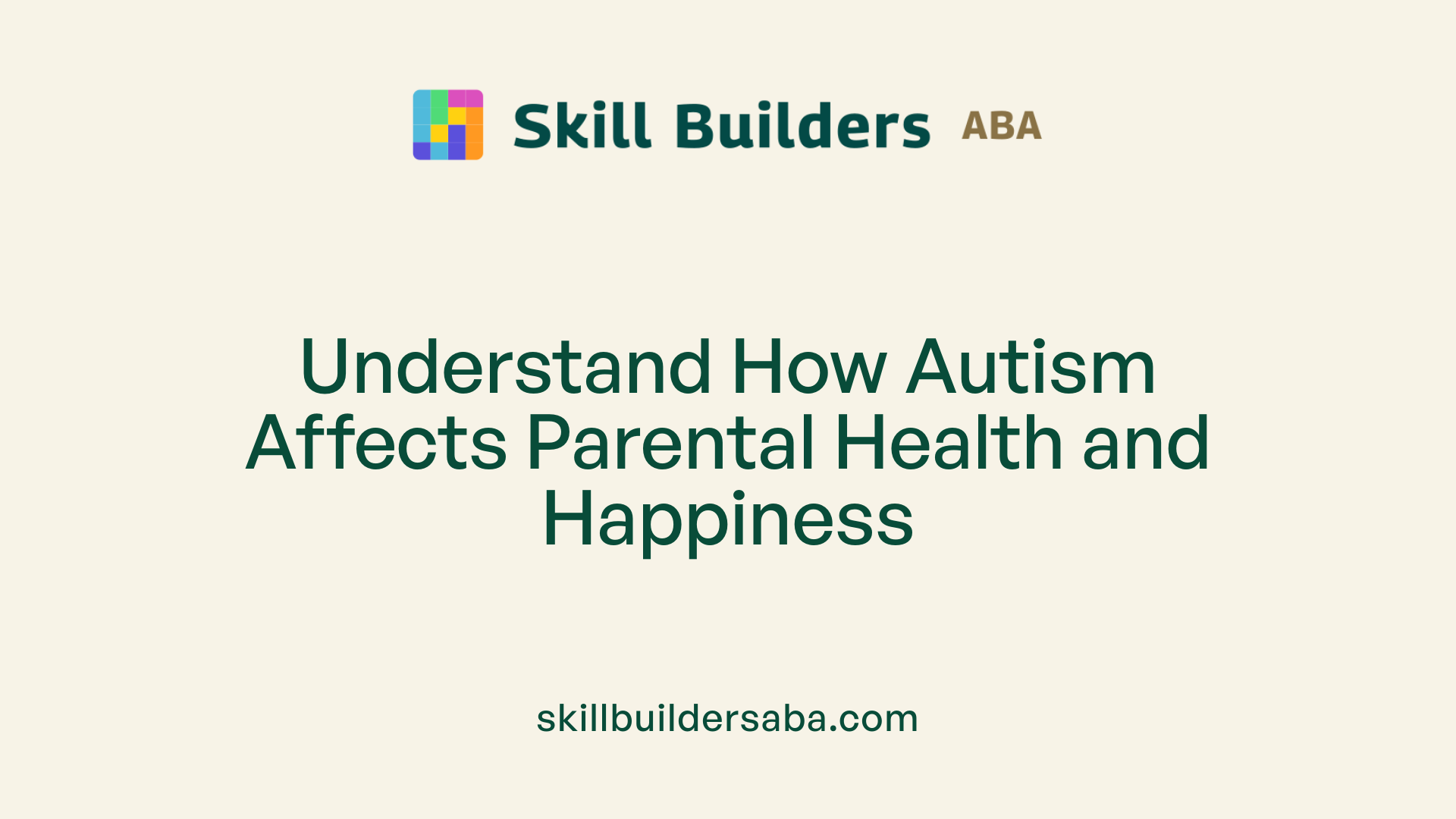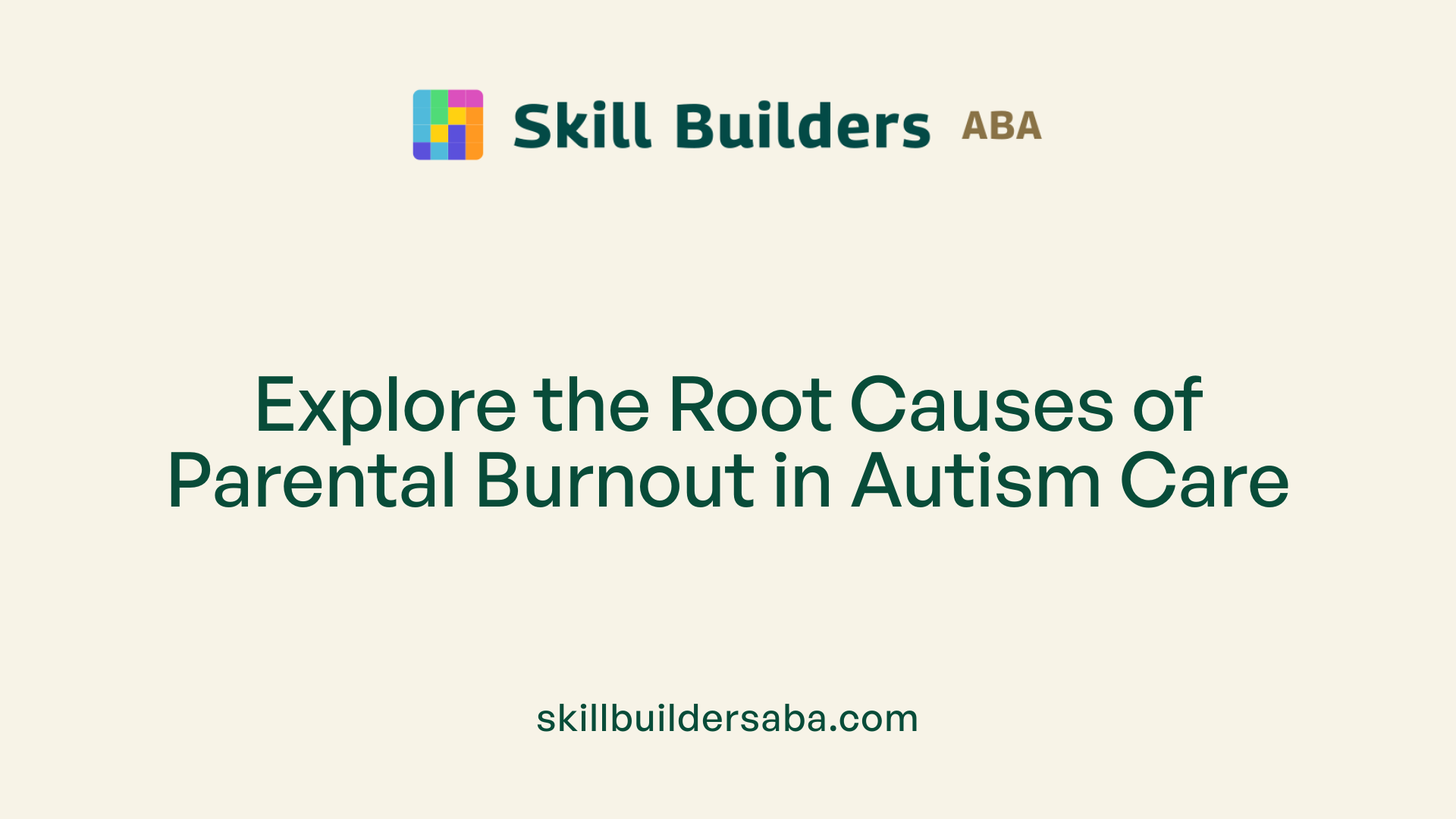Parental burnout and how to cope during autism therapy
Navigating the Challenges of Parenting a Child with Autism: Strategies for Well-being

Understanding Parental Burnout in Autism Caregiving
Raising a child with autism can be both rewarding and taxing. The constant demands of caregiving, behavior management, and navigating societal perceptions can lead to significant stress and burnout. Recognizing the signs and causes of burnout is essential for developing effective coping strategies and maintaining parental well-being.
The Impact of Autism on Parental Well-being

How does raising a neurodivergent child impact parental well-being, and what can parents do to support their mental health?
Caring for a child with autism significantly influences parents’ mental, emotional, and physical health. The constant demands of caregiving, managing behavioral challenges, and coping with sleep disturbances can lead to intense stress, exhaustion, guilt, and feelings of being overwhelmed. These experiences often evolve into burnout—a state characterized by emotional numbness, physical fatigue, and social withdrawal.
Parents might find themselves stuck in a cycle of high alert, continually problem-solving and responding to their child's needs. This persistent tension shifts them into a crisis mode, where they feel like they are merely 'going through the motions,' which further exacerbates feelings of emotional distancing and depression.
To help mitigate these effects, parents are encouraged to build strong support networks. Connecting with parent groups, friends, and community resources provides practical and emotional assistance. Engaging in self-care routines, such as regular mindfulness practice, hobbies, and maintaining a sense of humor, is vital for restoring resilience. Finding time for relaxation and reflection helps break the cycle of stress.
Seeking professional support, such as therapy or counseling, can also be highly beneficial. Mental health professionals can guide parents in developing coping mechanisms like cognitive reframing, emotional acceptance, and stress management techniques.
Understanding and recognizing the early signs of burnout, including fatigue, irritability, social withdrawal, and physical symptoms like headaches or gastrointestinal issues, is crucial. Addressing these symptoms early prevents deterioration and supports ongoing caregiving resilience.
Furthermore, combating societal stigma related to parental exhaustion and parenting challenges benefits overall mental health. Recognizing that these struggles are common and valid encourages parents to seek help without shame.
In essence, fostering a holistic approach—combining support systems, self-care, professional intervention, and societal understanding—can preserve parental well-being while ensuring that children with autism receive the necessary care.
How Behavioral Challenges and Sleep Disturbances Affect Mental Health
Children with autism often present with challenging behaviors such as meltdowns, aggression, or self-injury, frequently triggered by communication difficulties or pain. Managing these behaviors is taxing and can increase parental stress levels.
Poor sleep patterns in children with autism are common, leading to sleep deprivation for parents. Lack of restful sleep diminishes emotional regulation, heightens irritability, and impairs cognitive functions, compounding caregiver fatigue. Over time, this cycle of sleep deprivation and behavioral stressors contributes to burnout.
The Cycle of High Alert and Emotional Conservation in Parents
Parents tend to remain in an elevated state of alert, constantly monitoring and responding to their child's needs. This conserves energy temporarily but leads to emotional exhaustion.
Eventually, the parent’s emotional reservoir empties, resulting in emotional distancing or numbness. This conservation mode is a coping mechanism but can interfere with the nurturing aspect of caregiving and strain overall family dynamics.
Breaking this cycle involves intentional self-care, seeking support, and implementing effective behavioral interventions for the child. These steps help restore balance, reduce stress, and support parental mental health.
| Aspect | Effect on Parental Well-being | Support Strategies | Additional Details |
|---|---|---|---|
| Emotional Exhaustion | Leads to burnout, feelings of sadness, guilt, and shame | Mindfulness, therapy, peer support groups | Early recognition critical for intervention |
| Behavioral Challenges | Increase stress, feelings of helplessness | Behavior management training, professional support | Proper intervention can alleviate family distress |
| Sleep Disturbances | Result in fatigue, irritability, decreased cognitive functioning | Sleep routines, medical consultation, behavioral therapies | Enhances parent's overall resilience |
| Social Withdrawal | Reduces support, leads to isolation | Community involvement, online forums, family engagement | Online resources like courses and webinars offer accessible help |
| Physical Symptoms | Headaches, muscle pain, gastrointestinal issues | Medical assessment, relaxation techniques | Addressing physical health supports overall well-being |
Understanding these interconnected factors allows parents and professionals to develop comprehensive strategies for managing stress and preventing burnout. Ongoing support and tailored interventions can significantly improve parental mental health, fostering a more resilient caregiving environment.
Signs and Causes of Parental Burnout in Autism Caregiving

What are the signs and causes of parental burnout in parents of children with autism?
Parental burnout among caregivers of children with autism manifests as deep physical, emotional, and mental fatigue. Parents often experience intense exhaustion that goes beyond typical tiredness, leading to feelings of emotional numbness, detachment from their children, and a decreased sense of personal accomplishment. Common signs include sensory sensitivities, such as heightened reactions to noise or light, social withdrawal from friends and community, and difficulties in communication. These symptoms can make daily functioning challenging and diminish the overall quality of life for the parent.
The causes of this burnout are multifaceted. The ongoing demands of autism caregiving—managing behavioral challenges, navigating complex therapy routines, and addressing unexpressed pain or discomfort in children—require continuous effort and resilience. Societal stigma and misunderstanding further intensify stress, often resulting in feelings of isolation and frustration.
Insufficient support structures, including limited access to respite care and financial assistance, exacerbate parental strain. Family members may struggle with the emotional toll, especially if communication or family dynamics are strained. Parents with certain personality traits, such as high neuroticism or poor family functioning, are at increased risk of burnout. These factors contribute to a cycle where high stress levels lead to emotional exhaustion, which, if unaddressed, can result in physical symptoms like headaches, gastrointestinal issues, and muscle pain.
In addition, managing therapy routines, medical appointments, and behavioral interventions can be overwhelming. Beneath these practical challenges lie emotional burdens such as guilt, sadness, and feelings of helplessness. These emotional and physical stressors combine to create a cycle of high alertness, leading parents into what is called a conservation mode—emotional distancing and going through the motions of caregiving without fulfillment.
How do these signs and causes impact families?
The resultant burnout affects not only the parent’s health but also family relationships and the child's well-being. Strained relationships, social isolation, and emotional withdrawal can hinder effective caregiving and reduce family cohesion. Recognizing these signs early and understanding the causes are critical steps toward seeking appropriate help and support.
What can be done to address these issues?
Addressing parental burnout involves strengthening support networks—including parent groups, professional therapy, and community resources—to share experiences and gather practical advice. Consistent self-care practices such as mindfulness, maintaining routines, engaging in hobbies, and practicing self-compassion are vital.
Utilizing respite care services provides temporary relief, reducing stress and improving mental health. Building a strong support system that includes family, friends, and community organizations can offer emotional backing and practical assistance.
Furthermore, interventions like mindfulness-based programs can reduce stress, while therapeutic approaches, including parent training and professional therapy, help better manage anxiety and improve family dynamics. Accessing online resources, webinars, and courses from reputable organizations enhances education and coping strategies.
Finally, financial support programs—such as Medicaid waivers, SSI, and grants—help alleviate some of the economic burdens, easing the overall stress. Tackle these challenges holistically, combining emotional support, practical assistance, and personal self-care, to help parents maintain their well-being while providing the best care for their children.
Recognizing Early Signs of Burnout
What are the signs and causes of parental burnout in parents of children with autism?
Parental burnout among caregivers of children with autism manifests in multiple physical, emotional, and behavioral ways. Physically, parents often experience persistent fatigue, sleep disturbances, headaches, muscle pain, and gastrointestinal issues. These symptoms reflect the ongoing stress and exhaustion from constant caregiving demands.
Emotionally, signs include irritability, depression, emotional numbness, and increased anxiety. Parents may feel detached from their children or themselves, experiencing a diminished sense of fulfillment and joy in parenthood. Feelings of guilt, sadness, or shame related to their role can further intensify emotional distress.
Behavioral changes often involve social withdrawal, neglect of personal and family responsibilities, and difficulties in communication. Parents may isolate themselves from friends and community, avoiding social interactions that could provide support or relief.
Several factors contribute to burnout in this context. The demands of managing a child's behavioral challenges and therapy routines can be overwhelming. The societal stigma and lack of acceptance further isolate families, intensifying feelings of helplessness.
Insufficient access to respite care, financial assistance, and professional support compounds these issues. Parental personality traits, such as high neuroticism or poor family functioning, also increase vulnerability. Chronic stress from the ongoing challenges of autism creates a cycle of high alert, emotional exhaustion, and eventual emotional distancing.
Addressing these causes involves strengthening support systems, providing accessible respite services, and fostering societal understanding. Recognizing early warning signs and implementing mitigation strategies can significantly reduce long-term burnout.
What forms does parental burnout take?
Parents often exhibit a range of symptoms indicating burnout. These include:
| Symptom Type | Examples | Additional Notes |
|---|---|---|
| Physical | Fatigue, headaches, gastrointestinal issues, muscle pain | Often the earliest visible signs of stress and exhaustion |
| Emotional | Irritability, depression, emotional numbness | Feelings of detachment from children or responsibilities |
| Behavioral | Social withdrawal, neglect of responsibilities, communication difficulties | Reduced social interactions and engagement |
| Cognitive | Feelings of helplessness, decreased problem-solving | Reduced capacity to manage daily challenges |
Recognizing these signs early can help parents seek timely support, preventing escalation and promoting mental health.
Understanding the Causes of Burnout in Autism Parenting

What are the signs and causes of parental burnout in parents of children with autism?
Parental burnout among caregivers of children with autism is a profound state of exhaustion that encompasses emotional, physical, and mental domains. Parents may experience persistent fatigue, feelings of depersonalization — where they feel emotionally distant from their child — and a diminished sense of accomplishment in their caregiving roles. This burnout often manifests as physical symptoms like headaches, muscle pain, sleep disturbances, and gastrointestinal issues. Emotional signs include numbness, heightened anxiety, irritability, withdrawal from social activities, and feelings of sadness or shame related to their parenting role.
The roots of burnout are multifaceted. The ongoing, intense demands of caring for a child with autism are primary contributors. Managing complex routines, such as behavioral interventions, communication therapies, and medical needs, requires continuous effort. These routines often involve dealing with challenging behaviors triggered by communication difficulties or unexpressed discomfort, leading to heightened stress.
Crucially, societal factors play a substantial role. Stigma and a lack of societal acceptance can isolate parents, intensifying feelings of guilt and helplessness. Many face social withdrawal due to misunderstanding or judgment from others, which further diminishes their support network.
Insufficient resources also significantly contribute to burnout. Limited access to respite care, financial assistance, and professional support compounds stress and fatigue. The financial strain linked to therapies, specialized equipment, and medical expenses adds another layer of hardship.
Additional risk factors include the parents’ personalities — such as high neuroticism or low resilience — and poor family functioning, which can make managing daily challenges even more daunting. Remaining in a constant state of high alert, constantly problem-solving and adapting to unpredictable behaviors, leads many parents into a conservation mode — emotionally distancing and feeling like they are merely
Strategies to Prevent and Reduce Burnout

How can building a support network help parents manage stress?
Creating a network of support is essential for parents caring for a child with autism. Connecting with other parents through local support groups, online communities, or community events provides emotional reassurance and practical advice. These interactions help parents realize they are not alone, which can alleviate feelings of isolation and guilt.
Support networks can also include family members, friends, and professionals who understand the specific challenges of autism caregiving. Regular communication and shared experiences help parents gain different perspectives and coping strategies, promoting resilience and emotional stability.
What role does respite care play in managing caregiver stress?
Respite care services offer temporary relief by providing professional or volunteer caregivers to step in when parents need a break. Whether it’s a few hours or several days, this break allows parents to rest, run errands, or engage in personal activities.
Utilizing respite care can significantly reduce feelings of exhaustion and emotional overwhelm. It helps prevent burnout by giving parents time to recharge physically and mentally, thus maintaining their ability to care effectively for their child.
How can mindfulness and self-care routines help reduce stress?
Incorporating mindfulness practices such as meditation, deep breathing exercises, or yoga can help parents manage daily stressors. These techniques promote relaxation, improve emotional regulation, and enhance mood.
Establishing routines that include hobbies, physical activity, or enjoyable activities is equally important. Prioritizing self-care fosters resilience, helps maintain emotional balance, and prevents burnout.
Simple actions like maintaining a healthy diet, getting enough sleep, and setting aside time for leisure contribute to overall well-being.
Combining strategies for effective stress management
Effective stress management involves a combination of community support, respite care, and mindfulness. When these strategies are integrated into daily life, parents are better equipped to handle the persistent demands of caring for a child with autism.
Creating a proactive plan to access support systems, schedule respite care, and dedicate time for self-care can make a meaningful difference in reducing burnout risk. Over time, these practices lead to improved family relationships, better mental health, and a more positive caregiving experience.
Practical tips summary
Below is a summarized table of strategies:
| Strategy | Description | Benefits |
|---|---|---|
| Support Networks | Join parent groups, online forums, or community programs. | Emotional support, shared knowledge |
| Respite Care | Use services for temporary caregiving breaks. | Prevents exhaustion, supports mental health |
| Mindfulness & Self-care | Practice meditation, hobbies, and routines. | Reduces anxiety, promotes well-being |
Implementing these tactics fosters resilience and sustains parents’ ability to care long-term without succumbing to burnout.
The Role of Support Systems and Community Resources
What resources are available to help parents manage stress and prevent burnout when raising a child with autism?
Parents caring for a child with autism often face ongoing challenges that can lead to burnout. To support these parents, many resources have been developed to ease the burden and promote mental health.
Support groups, both physical and virtual, are valuable sources of emotional comfort. Sharing experiences with others who understand the unique demands of parenting a child with autism can lessen feelings of isolation. These groups often provide practical advice and encouragement, fostering a sense of community.
Professional support, including counseling and family therapy, plays a crucial role in helping parents process their feelings. Mental health professionals can assist with managing anxiety, depression, and emotional exhaustion that frequently accompany caregiving.
Respite care services offer temporary relief, allowing parents time to rest, recharge, and attend to their own needs. These services are accessible through various programs such as Medicaid waivers, state grants, and local community organizations. Respite can be provided in-home or through day programs, and it helps prevent caregiver fatigue and improve family dynamics.
Community resources extend beyond immediate support. Local organizations, educational programs, and health services collaborate to provide training on autism-specific strategies, medical support, and behavioral interventions. Accessing these services can reduce the stress related to managing challenging behaviors and improve overall family well-being.
In addition to formal resources, self-care practices are key. Techniques like mindfulness meditation, engaging in hobbies, maintaining routines, and seeking social activities contribute to resilience. Building a support network involving family, friends, and community groups creates a safety net for caregivers.
How social and emotional support alleviates stress and burnout?
Social and emotional support serve as protective factors against parental burnout. Having a network to share concerns and successes can diminish feelings of loneliness.
Support from family and friends offers both practical assistance—like babysitting or errands—and emotional comfort, which can buffer stress during difficult times.
Online communities and parent forums provide a platform for sharing resources, coping strategies, and experiences, broadening the scope of support beyond local limitations.
This availability of diverse support options fosters a sense of belonging and reassurance that parents are not alone in their journey. Ultimately, it promotes resilience, helps maintain mental health, and improves family dynamics.
Resources Summary Table
| Resource Type | Examples | Benefits | Access Methods |
|---|---|---|---|
| Support Groups | Local parent support groups, online forums | Emotional support, sharing practical tips | Community centers, websites, social media |
| Professional Support | Therapy, counseling, psychiatric services | Address mental health, stress management | Clinics, online platforms |
| Respite Care | In-home respite, day programs, overnight services | Temporary relief, reduce exhaustion | Medicaid waivers, community organizations |
| Community Services | Autism education programs, medical services, behavioral interventions | Reduce parenting stress, improve child's skills | Local health departments, educational institutions |
| Self-care Strategies | Mindfulness, hobbies, routines | Build resilience, emotional regulation | Self-guided, workshops, online courses |
Building awareness of and access to these resources can significantly decrease caregiver stress and help parents maintain their well-being. When supported properly, parents are better equipped to foster positive outcomes for their children and themselves.
Effective Support Strategies and Therapeutic Interventions
What role do parent training programs, professional therapy, and behavioral management play in supporting parents of children with autism?
Parent training programs are designed to equip caregivers with practical skills to better understand and manage their child's behaviors. These programs often include instruction on communication strategies, behavior modification techniques, and daily routines, helping parents feel more confident in their caregiving role.
Professional therapy, such as behavioral therapy (e.g., Applied Behavior Analysis or ABA) and speech therapy, not only assists children but also alleviates parental stress by reducing challenging behaviors. When children show progress through targeted interventions, parents often experience less frustration and emotional toll.
Behavioral management in autism involves comprehensive, individualized strategies to address specific behaviors that may cause caregiver burnout. These include positive reinforcement, establishing clear routines, and teaching alternative communication skills. Effective management can diminish problematic behaviors and foster a more predictable and manageable environment for both child and parent.
How can reducing challenging behaviors through autism-specific interventions ease family stress?
Challenging behaviors such as meltdowns, aggression, or self-injury often stem from communication difficulties, sensory overload, or unexpressed discomfort. Autism-specific interventions aimed at reducing these behaviors focus on improving communication, sensory regulation, and emotional understanding.
By addressing underlying causes, these interventions help children better navigate their environment, which often leads to a decrease in problematic behaviors. When children display fewer intense outbursts, parents feel more equipped to handle daily routines, fostering a calmer household.
Moreover, fewer challenging behaviors can improve family relationships and social interactions, reducing feelings of guilt, sadness, and social withdrawal experienced by many parents.
What practical strategies can help parents manage stress and prevent burnout when caring for a child with autism?
Parents can take several steps to manage stress and lower their risk of burnout:
- Build a Support Network: Connecting with support groups, online communities, and other parents fosters emotional understanding and shared experiences.
- Utilize Respite Services: Taking breaks through respite care gives caregivers necessary time to rest physically and mentally.
- Practice Mindfulness and Relaxation Techniques: Techniques like meditation, deep breathing, and physical activity reduce anxiety and promote emotional stability.
- Prioritize Self-Care: Ensuring regular exercise, healthy eating, and adequate sleep maintains resilience.
- Set Realistic Expectations: Accepting limitations and celebrating small successes can reduce feelings of failure or frustration.
- Seek Professional Help: Counseling or therapy offers a safe space to process emotional challenges and develop coping strategies.
- Gain Autism Knowledge: Accessing educational resources tells parents what to expect and how to respond effectively, empowering them to manage challenges confidently.
This comprehensive approach helps parents sustain their well-being and provides a more supportive environment for their child.
| Support Strategies | Therapeutic Interventions | Benefits |
|---|---|---|
| Parent support groups | Parent training programs | Increased understanding of autism and behavior management techniques |
| Online communities | Behavioral management techniques | Reduction in challenging behaviors and family stress |
| Respite care services | Communication and social skills therapy | Improved mental health for caregivers and better child's development |
| Mindfulness and relaxation exercises | Sensory regulation interventions | Decreased anxiety and emotional exhaustion |
| Self-care and realistic planning | Educational programs and webinars | Enhanced family functioning and reduced burnout |
Addressing parental burnout requires a multifaceted approach that combines effective support networks, professional therapeutic services, and targeted behavioral interventions. By understanding and implementing these strategies, parents can better manage the demands of caring for a child with autism and foster a healthier family dynamic.
Research Findings on Stress and Coping Among Parents of Children with Autism

What does research say about stress, burnout, and effective coping strategies for parents of children with autism?
Research consistently indicates that parents caring for children with autism face considerably higher stress levels compared to parents of neurotypical children. This elevated stress stems from managing ongoing behavioral challenges, communication hurdles, and dealing with societal stigma and misunderstanding.
Such persistent stress can push parents toward burnout—a state of profound emotional, mental, and physical exhaustion. Burnout manifests through symptoms like continuous fatigue, emotional numbness, increased anxiety, and physical health issues including headaches, gastrointestinal problems, and muscle pain.
However, studies highlight that certain protective factors can mitigate the impact of stress. Social support plays a crucial role. Support from family, friends, peer groups, and community organizations provides emotional comfort and practical assistance, helping parents cope more effectively.
Self-efficacy, or parents’ belief in their ability to manage caregiving demands, also correlates with lower stress levels. When parents feel competent, they are less likely to experience feelings of helplessness and frustration.
Effective coping strategies are essential. Positive approaches such as mindfulness, problem-solving, emotional acceptance, and cognitive reframing help parents manage their emotional responses and maintain well-being.
Mindfulness-based practices, including meditation and focusing on physical sensations, have shown to reduce stress, depression, and improve sleep among parents. Establishing routines, engaging in hobbies, and maintaining a sense of humor serve as additional resilience tools.
Conversely, dysfunctional mechanisms like denial, self-blame, behavioral disengagement, and substance use can worsen stress levels and increase the risk of burnout.
Interventions focusing on improving social support, fostering parental self-efficacy, and teaching positive coping skills are effective in alleviating stress. Parent training programs, therapy, and online educational resources provide valuable guidance.
Why Addressing Dysfunctional Coping is Essential
Addressing maladaptive coping mechanisms is crucial for long-term mental health. Recognizing early signs of emotional overload allows for timely intervention, preventing escalation to burnout.
Programs that incorporate psychoeducation about stress, mindfulness training, and peer support networks help parents develop healthier coping habits.
Cross-cultural research suggests that while experiences vary based on cultural context, the presence of support systems and effective coping strategies universally influence parental resilience.
Building strong social networks and promoting adaptive coping remains a universal priority in supporting parents of children with autism.
| Aspect | Impact | Supporting Details |
|---|---|---|
| Stressors | Behavioral challenges, societal stigma, communication difficulties | These contribute to emotional overload and burnout risk |
| Protective Factors | Social support, self-efficacy, adaptive coping | These buffer against high stress levels |
| Dysfunctional Coping | Denial, self-blame, disengagement | Exacerbate stress and impede emotional resilience |
| Effective Interventions | Support groups, mindfulness programs, parent training | Improve mental health and caregiving outcomes |
| Cultural Considerations | Similar core dynamics with local adaptations | Emphasize tailored support worldwide |
Understanding these dynamics allows for targeted strategies to help parents manage stress, maintain their well-being, and continue providing quality care for their children.
Fostering Resilience and Long-Term Well-being in Autism Parents
Addressing parental burnout requires a multifaceted approach that includes strengthening support networks, engaging in effective self-care, and advocating for societal acceptance and accessible resources. By recognizing early signs of stress and utilizing available support systems—such as respite care, therapy, community groups, and evidence-based coping strategies—parents of children with autism can better manage their mental health and sustain their caregiving roles with resilience and hope.
References
- Effective Strategies For Managing Autism Parent Burnout
- Coping with Burnout as a Parent of a Special Needs Child
- How Parents and Caregivers of Kids with Autism Cope ...
- Neurodivergent, ADHD, and Autistic Parent Burnout
- Effective Strategies For Managing Autism Parent Burnout
- Mental Health Interventions for Parent Carers of Children ...
- Caregiver Burnout: Why Self-Care Is Essential to Parenting
- Caregiver Burnout: 6 Incredible Preventing Strategies
- Self-Care Tips for Caregivers of Individuals with IDD
- Coping resources and stress due to demands in parents ...
.svg)














